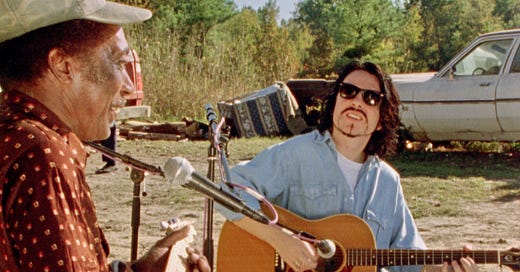On Disc: Deep Blues
The re-release of Robert Mugge's documentary about the quintessentially American musical genre remains one of the richest explorations of the blues.
In 1990, filmmaker Robert Mugge embarked on a quest similar to music historian Alan Lomax, recording blues musicians in Memphis, the North Mississippi Hill Country and in the Mississippi Delta. Famed music writer Robert Palmer is your guide to this trip through the south, conversations with musicians and locals and a bit of histoy of the towns and the music. The result is “Deep Blues,” one of the most imporant blues documentaries ever made. It's part blues history lesson and part Saturday night out captured on film.
“Deep Blues has been reissued, restored on re-released on Film Movement Plus.
This documentary was commissioned by musician Dave Stewart of The Eurythmics, who appears at the beginning of this cinematic journey while on a short break form touring. Like many musicians over the pond, Stewart spent a lot of his youth buying imported early blues and rock and roll records, devouring every tune on every record. To watch a world-traveled musician listening and in some cases sitting in (not hogging the spotlight) with these blues trailblazers was inspiring.
These musicians are not played 20 times a day on the radio or online. They don't live in mansions. Not posturing. By the end of the ‘90s, many of these artists got small record deals and got to tour. By van, not by jet. Just the songs and the truth.
Solo piano by Booker T. Laury, solo guitar by R.L. Burnside, Jessie Mae Hemphill with her fife and drum band (fife and drum don't get enough love or airplay), Junior Kimbrough, Roosevelt "Booba" Barnes, Big Jack Johnson, Jack Owens with Bud Spires and a one-string performance on a front porch by Lonnie Pitchford. No high-energy, suburban guitar-slingers here. The musical fire from these musicians comes from their own life stories and not copying rock musicians note-for-note.
If you saw the imaginary blues band Blues Hammer in the film Ghost World and didn't get the joke, you need to watch “Deep Blues.” Twice.
Director Robert Mugge has a fine, "you are there" intimate approach. Part out of necessity due to venue size, or lack of it (these juke joints were not The Vogue) and part of just letting the audience see and hear a performance au natural. Remember, MTV wasn't even a decade old. The amount of cuts “Deep Blues” makes on one song could fill the first verse of a music video.
Artistic expression can be a long road when it comes to recognition. The music in “Deep Blues” sounds just as fresh and relevant now as it did 30 years ago. Documentaries are more accessible now than ever before and “Deep Blues” is still one of the most important.
Mugge has an entire catalog of documentaries (music and otherwise), which you can check out at robertmugge.com. Here's hoping more of his films get a restoration treatment like the one Deep Blues got from Film Movement Classic.
Dear Film Movement Plus, hint hint...
Matthew Socey is host of The Blues House Party and Film Soceyology for WFYI 90.1 FM in Indianapolis.




